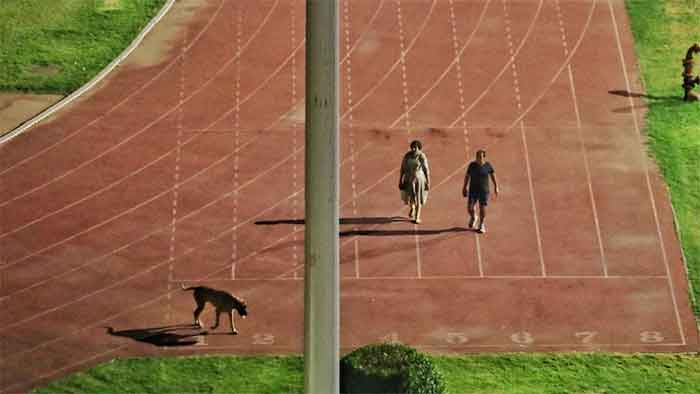
This is a mild punishment for the arrogant IAS officer of Delhi but there is some imagination in it. He has been shunted to Ladakh bordering Pakistan and his IAS officer wife sent to the other end of the country to Arunachal Pradesh bordering China.
A positive fallout of the case is that stadiums in Delhi will now be open to athletes in Delhi till 10 p.m. providing them some relief from the summer heat. It should create a great awakening among sportspersons and also pedestrians who are being given a raw deal by the bureaucracy and other sections.
The Indian Express needs to be commended for working for days in reporting how Delhi’s revenue secretary Sanjeev Khirwar, a senior IAS officer, used to get the Thyagaraja stadium vacated by 6 p.m. or so every day so that he could take a walk with his dog. Media photos show his wife Rinku Dugga also taking a walk in the empty stadium.
Part of the reason the IAS officers can behave so arrogantly even in Delhi, one can imagine the behaviour in other areas, is the media is so docile, it succumbs to so many inducements from politicians and bureaucrats. Corruption in the top of the media has now made things worse.
NDTV did well to interview Andrew Amsan and another journalist of the Indian Express. In an interview to India Today TV Ajay Dua, a retired IAS officer of the Maharashtra cadre, criticised the Delhi officer but claimed he was unaware of the IAS officers in Maharashtra who had demanded lifetime membership of Bombay Gymkhana. It is hard to believe he was really unaware , most likely he was trying to protect his colleagues.
Bhaichung Bhutia, the star football player, said in his home state Sikkim a public ground had been converted into a hospital and such insulting treatment to sportspeople was far from common. He was supported by Ashwini Nachappa and other sportspersons. Rahul Mehra, a Supreme court lawyer taking up the case of injustice to athletes in stadiums, said khelo India was fine but it should be Kholo India, where all sports facilities should be opened for players, athletes.
I have met a lot of good bureaucrats in my career as a journalist but also found some uncouth ones. I was once in the media enclosure in Shivaji Park in Mumbai attending a meeting of Sonia Gandhi more than 20 years ago. It was a hot day and the organisers put drinking water bottles on the table. One IAS officer, an election observer of the Maharashtra cadre, as it turned out, snatched a bottle from the table and would not share it. Then a volunteer, unware who the worthy was, took it away and gave it to someone else, by this time the officer had learn to be not so arrogant.
Then here was another officer who would inquire on the phone about a Times of India colleague and would bang down the phone without a please or a thank you.. This was in the pre mobile phone days.
The media would do well to work on a report about walking conditions in the neighbourhood of IAS officers. Obviously these areas are posh but the point is many snobbish, upper class people now are ashamed of walking on the road like common people, so they want special jogging tracks and as in this case they want an entire stadium to themselves. No wonder they do not care to provide good footpaths and other amenities for common people. Besides, many of these officers apparently are using government vehicles for their private use. Of course that is another big subject.
This morning I saw a car outside Joggers Park in Bandra with letters Bharat Sarkar prominently written on it, a patently illegal act but these are the little ways these little men with huge egos want to flaunt their authority. A fierce sense of entitlement is their hallmark.
There is no shortage of whole books and reports on administrative reforms. One wonders what have they all led to.
Some IAS officers too have had a critical look at the bureaucracy in books, the most recent is What Ails and IAS ? by N.C. Saxena, former cabinet secretary, with a foreword by Harsh Mander, noted former IAS officer.
But the best is probably by an outsider, an academic,
Red Tape:Bureaucracy, Structural Violence, and Poverty in India
By
Akhil Gupta. It
presents a major new theory of the state developed by the renowned anthropologist, as an observe has put it.. Seeking to understand the chronic and widespread poverty in India, the world’s fourth largest economy, Gupta conceives of the relation between the state in India and the poor as one of structural violence. Every year this violence kills between two and three million people, especially women and girls, and lower-caste and indigenous peoples. Yet India’s poor are not disenfranchised; they actively participate in the democratic project. Nor is the state indifferent to the plight of the poor; it sponsors many poverty amelioration programs.
Gupta conducted ethnographic research among officials charged with coordinating development programs in rural Uttar Pradesh. Drawing on that research, he offers insightful analyses of corruption; the significance of writing and written records; and governmentality, or the expansion of bureaucracies. Those analyses underlie his argument that care is arbitrary in its consequences, and that arbitrariness is systematically produced by the very mechanisms that are meant to ameliorate social suffering. What must be explained is not only why government programs aimed at providing nutrition, employment, housing, healthcare, and education to poor people do not succeed in their objectives, but also why, when they do succeed, they do so unevenly and erratically.
Clearly our bureaucrats need to do a lot of introspection, behave with humility, yes they must do that
Vidyadhar Date is a senior journalist and author of a book on public transport










































